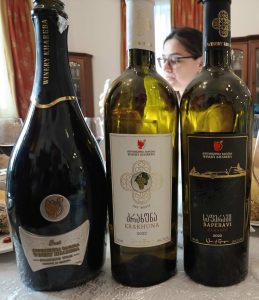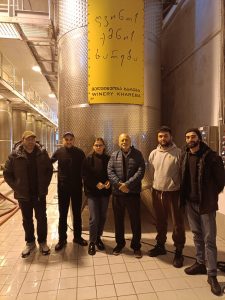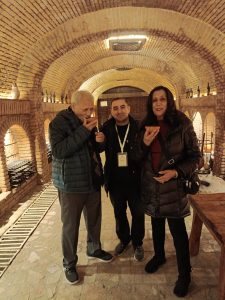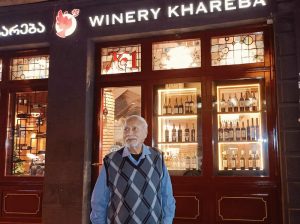
With Vladimer Kublashvili and Aleksandre Kharebava at the company headquarters
Posted:Monday, 29 January 2024 23:50
K.I.S.S. Georgia: Visiting Winery Khareba- Part 2

Try to Google ‘what is Georgia known for’ and you would get the answer ‘it is the cradle of wine–Georgia boasts a wine-making culture dating back to 6,000 BCE. The wine earthenware pot called qvevri is buried underground for up to 50 years to produce and preserve Georgian made wine. An important part of Georgian culture, wine is central to Georgian art and architecture.’
Recent History
In recent history, Georgia was known to be the satellite country of Russia. During the Soviet regime, Russia had made all the satellite wine producing countries to produce high volumes of a specific sector for consumption by the Russian domestic sector. Georgia had been assigned to produce sweet and semi- sweet wines that were in great demand by Russians. This kept the wineries going in Georgia and provided all the wine Russians consumed. Quantity was the rule, quality was not sacrosanct.
Also Read : Wine Travels Feature: K.I.S.S. Georgia- the Cradle of Wine in Europe

Georgia came out from the clutches of Russia after the USSR bloc was dismantled in April 1991, being the first non-Baltic republic of the Soviet Union to officially declare independence. It started expanding fast in the mid-nineties with constant improvement of quality thanks to the technology available in Georgia. The industry was given support to start commercial production of all styles of wines for domestic consumption. New capacity was created with more modern facilities.
Winery Khareba

Winery Khareba is a part of the new generation of wine producers, founded in 1995. I had the pleasure of visiting two of their four wineries in Kakheti and Imereti last month. This progressive company is known for preserving unique winemaking culture using traditional methods as well as modern technologies for creating high-quality products.
The family business is a big conglomerate, having fingers in many pies including wine, hotels (Ginger and Crown Plaza), packaged water (KOBI), hospital furniture, fashion clothing and several other products not only in Georgia but even in countries like Switzerland and Germany. Wine is an important part of their business and with a surface area of about 1500 hAs-many at higher altitudes, and production of over 4.5 million bottles- a significant number exported to Poland, China and Russia, they are an important contributor to the blossoming wine industry in Georgia.

Winery Khareba constitutes 15 tunnels 7.7 Kms. long. Two tunnels reaching 800 meters are parallel to each other and connect the other tunnels that are 500 meters long. The walls of the tunnels are lined with around 26,000 (max capacity) bottles of Khareba wines. The tunnels keep the temperature relatively constant naturally at 13-15°C and keep the wines cool.
Known as Kvareli Caves, the outside area at entry is adorned with counters and different wines that can be tasted by the wine tourists under various packages. We traversed a couple of these tunnels with multiple tasting counters that could accommodate big groups of visitors at a time. Towards the end are 3 qvevries filled to the brim. With a solemn ritual that is normally performed at the beginning of a harvest or if the tourists flocking to taste so desire, we had the singers perform the ritual which is so well articulated in the Georgian wine culture and were served the wine in earthen cups, like our tea kulhars. The Saperavi wine was absolutely delicious, with layers of flavours, thanks also to the ceremony.
Also Read : Wine and Food Travel: Qvevri Wine Making Tradition of Georgia
Before walking to a newly built restaurant, we first walked to a Masterclass for making Shoti (a form of Georgian bread) After our tasting in the subdued lighted tunnels, we visited the Restaurant that sells Georgian cuisine with their wines and is a great meeting point for winery weddings and parties and serves as a Lunch room for visitors for a relaxed meal.

Khareba Winery is a company that helps in preserving the wine culture, culinary traditions and history of Georgia. The priority of the company is to produce high quality wine grapes cultivated in its own vineyards in eastern and western Georgia according to the best traditional as well as modern technology.
The company grows 25 different grape varieties in 7 micro-zones in over 1,500 hectares of land the majority of which are found in the traditional Georgian vinicultural regions of Kakheti (80%), Imereti (15%), Racha (3%) and Lechkhumi (2%). Their two wineries. I visited are in Kakheti (eastern Georgia_ and Imereti (western Georgia).

Khareba renovated its winery in 2011 in Terjola on the eastern entry point of Imereti where all premium quality wines of the company are produced. The winery is equipped with completely modern equipment-some of which is not seen even in modern wineries in Italy, France and Spain. Winery Khareba also produces sparkling wines according to the classic method in Terjola. It produces a complete range of wines: premium wines; appellation of origin wines; aged wines; proprietary table wines; dry and semi-dry sparkling wines, Qvevri wines and also Chacha liquor and Brandy.
According to Vladimer, about 5% of their total production is Qvevri wines which I found very fresh and slightly earthy and rustic but with a distinct Georgian personality. As Vladimer points out, like most Georgian winemakers, these wines are not natural wines or the orange wines as they are known in the US. Georgians like to call them Amber wines due to their colour. One hopes that outsiders respect this form of unique winemaking and stick to calling them Amber and not orange wines, says Vladimer. As a part of their commitment to traditional Georgian agronomy Khareba also produces grape seed oil and honey.

Also Read : K.I.S.S. Georgia-the Oldest Wine Producing Nation
Art of Blending at Khareba
In winemaking, every stage matters, starting from the harvest till the time of bottling and even aging in the bottle. Although fermentation is a very important part of the process, there are other important factors that make Khareba wines rather unique. As the winemaker Vladimer shares, ‘the most enjoyable part of winemaking is blending. Nothing beats the excitement of how adding 1% or 2% of different lots of the same wines can completely change the whole assemblage. Blending is a piece of art for me and I enjoy it the most.’
13 Tasting Rooms spread across Georgia

Tasting rooms and Shops are an important part of wine tourism for Winery Khareba. Khareba has created an excellent Tourism Center in Kvareli, Kakheti, but not everyone can visit Kvareli- a 2.5 hour drive from Tbilisi, especially since many tourists visit only Tbilisi and the old town of Mtskheta. Khareba has 13 tasting rooms spread in Georgia – including one in the Tbilisi city center and also one just outside the Mtskheta Svetitskhoveli Cathedral (the old Orthodox Church which is now a UNESCO Heritage spot) which attracts hordes of tourists. The Beach Resort of Batumi also boasts of one such ‘shop’. For details, visit https://winery-khareba.com
A visit to any of these shops gives the tourists an opportunity to taste and buy wines. (The rule of a minimum distance of 100 meters between a religious place and a wine dispensing shop/room does not apply in Georgia which incidentally does not consider wine as an alcoholic beverage but a food drink and Georgian tradition Most families have their own small qvevri wineries where they make wine for their own consumption. They may be stored in qvevries for 50 years as the Google search points out.
Georgia is a beautiful country with excellent family traditions. Winery Khareba is a vehicle to continue with the culinary tradition in a holistic way. Cheers to Khareba, Georgia and the Indian visitors who are frequenting the country that might soon join the EU and become a part of NATO soon.
GAUMARJOS! CHEERS!! JAI HO!!!
For more information on Khareba Winery visit their website or write to info@winerykhareba.com
Subhash Arora




